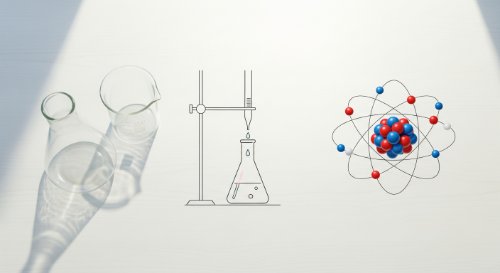Pressure of gases - Gas Laws | Kinetic Theory of Matter and Gas Laws - Chemistry (Undergraduate Foundation)
SPONSORED Get Personalized Tutoring NowStruggling with a tough concept or looking to advance your skills? Our expert tutors offer one-to-one guidance tailored to your unique needs.
Get instant support, clear explanations, and practical strategies to master even the most challenging subjects. With flexible scheduling and customized learning plans, success is just a session away.
Book your personalized tutoring today and start achieving your academic goals!
Get Personalized Tutoring NowStruggling with a tough concept or looking to advance your skills? Our expert tutors offer one-to-one guidance tailored to your unique needs.
Get instant support, clear explanations, and practical strategies to master even the most challenging subjects. With flexible scheduling and customized learning plans, success is just a session away.
Book your personalized tutoring today and start achieving your academic goals!
Struggling with a tough concept or looking to advance your skills? Our expert tutors offer one-to-one guidance tailored to your unique needs. Get instant support, clear explanations, and practical strategies to master even the most challenging subjects. With flexible scheduling and customized learning plans, success is just a session away. Book your personalized tutoring today and start achieving your academic goals!
 Kinetic Theory of Matter and Gas Laws - Chemistry (Undergraduate Foundation)This course provides a rigorous treatment of the Kinetic Theory and the Gas Laws, explaining the physical principles that control the behaviour of solids, liquids, and gases. We move from the foundational kinetic postulates to the precise mathematical relationships required to model matter's response to energy, pressure, and temperature.
These principles dictate real-world engineering, not just textbook theory. You will apply this knowledge to model atmospheric dynamics, design efficient chemical reactors, and optimise engine performance. A command of these laws allows you to quantify substance behaviour under varying conditions, solving the calculation pain points often faced in process engineering and physical science.
By the end of this course, you will confidently apply Boyle's, Charles's, Avogadro's, and the Combined Gas Laws to determine unknown state variables. You will derive and utilize the Ideal Gas Equation, PV = nRT, and explain gas properties using kinetic theory postulates. Additionally, you will analyse the structure of solids and calculate gas density.
This is a mandatory foundation for Chemistry and Chemical Engineering undergraduates and a prerequisite for thermodynamics. It is intended for learners with a grasp of chemical bonding who require a structured, student-centred alternative to disjointed free resources.
Kinetic Theory of Matter and Gas Laws - Chemistry (Undergraduate Foundation)This course provides a rigorous treatment of the Kinetic Theory and the Gas Laws, explaining the physical principles that control the behaviour of solids, liquids, and gases. We move from the foundational kinetic postulates to the precise mathematical relationships required to model matter's response to energy, pressure, and temperature.
These principles dictate real-world engineering, not just textbook theory. You will apply this knowledge to model atmospheric dynamics, design efficient chemical reactors, and optimise engine performance. A command of these laws allows you to quantify substance behaviour under varying conditions, solving the calculation pain points often faced in process engineering and physical science.
By the end of this course, you will confidently apply Boyle's, Charles's, Avogadro's, and the Combined Gas Laws to determine unknown state variables. You will derive and utilize the Ideal Gas Equation, PV = nRT, and explain gas properties using kinetic theory postulates. Additionally, you will analyse the structure of solids and calculate gas density.
This is a mandatory foundation for Chemistry and Chemical Engineering undergraduates and a prerequisite for thermodynamics. It is intended for learners with a grasp of chemical bonding who require a structured, student-centred alternative to disjointed free resources.
This course provides a rigorous treatment of the Kinetic Theory and the Gas Laws, explaining the physical principles that control the behaviour of solids, liquids, and gases. We move from the foundational kinetic postulates to the precise mathematical relationships required to model matter's response to energy, pressure, and temperature. These principles dictate real-world engineering, not just textbook theory. You will apply this knowledge to model atmospheric dynamics, design efficient chemical reactors, and optimise engine performance. A command of these laws allows you to quantify substance behaviour under varying conditions, solving the calculation pain points often faced in process engineering and physical science. By the end of this course, you will confidently apply Boyle's, Charles's, Avogadro's, and the Combined Gas Laws to determine unknown state variables. You will derive and utilize the Ideal Gas Equation, PV = nRT, and explain gas properties using kinetic theory postulates. Additionally, you will analyse the structure of solids and calculate gas density. This is a mandatory foundation for Chemistry and Chemical Engineering undergraduates and a prerequisite for thermodynamics. It is intended for learners with a grasp of chemical bonding who require a structured, student-centred alternative to disjointed free resources.
 CHM 101: General Chemistry IThis learning track delivers the complete NUC CCMAS curriculum for General Chemistry I. It is a comprehensive programme designed to build a robust, university-level foundation in modern chemistry. The track systematically covers all essential topics, from atomic theory, chemical bonding, and the states of matter, to the quantitative principles of stoichiometry, equilibrium, thermodynamics, and kinetics.
This programme is for first-year undergraduates in science, technology, engineering, and mathematics (STEM) faculties who are required to take CHM 101. It is also essential for any student or professional globally who needs a rigorous and complete foundation in first-year university chemistry for further study or career development.
This track delivers a full skill set in chemical theory and quantitative problem-solving. Graduates will be able to determine molecular structures, calculate reaction quantities, analyse the energetics and rates of reactions, and solve complex equilibrium problems. This programme provides the non-negotiable prerequisite knowledge for all subsequent chemistry courses and for any degree in the physical sciences, engineering, or medicine.
CHM 101: General Chemistry IThis learning track delivers the complete NUC CCMAS curriculum for General Chemistry I. It is a comprehensive programme designed to build a robust, university-level foundation in modern chemistry. The track systematically covers all essential topics, from atomic theory, chemical bonding, and the states of matter, to the quantitative principles of stoichiometry, equilibrium, thermodynamics, and kinetics.
This programme is for first-year undergraduates in science, technology, engineering, and mathematics (STEM) faculties who are required to take CHM 101. It is also essential for any student or professional globally who needs a rigorous and complete foundation in first-year university chemistry for further study or career development.
This track delivers a full skill set in chemical theory and quantitative problem-solving. Graduates will be able to determine molecular structures, calculate reaction quantities, analyse the energetics and rates of reactions, and solve complex equilibrium problems. This programme provides the non-negotiable prerequisite knowledge for all subsequent chemistry courses and for any degree in the physical sciences, engineering, or medicine.
This learning track delivers the complete NUC CCMAS curriculum for General Chemistry I. It is a comprehensive programme designed to build a robust, university-level foundation in modern chemistry. The track systematically covers all essential topics, from atomic theory, chemical bonding, and the states of matter, to the quantitative principles of stoichiometry, equilibrium, thermodynamics, and kinetics. This programme is for first-year undergraduates in science, technology, engineering, and mathematics (STEM) faculties who are required to take CHM 101. It is also essential for any student or professional globally who needs a rigorous and complete foundation in first-year university chemistry for further study or career development. This track delivers a full skill set in chemical theory and quantitative problem-solving. Graduates will be able to determine molecular structures, calculate reaction quantities, analyse the energetics and rates of reactions, and solve complex equilibrium problems. This programme provides the non-negotiable prerequisite knowledge for all subsequent chemistry courses and for any degree in the physical sciences, engineering, or medicine.